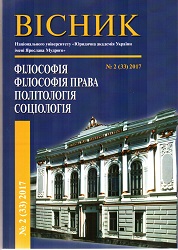СПЕЦИФІКА ІДЕОЛОГІЇ В ПАРАДИГМІ ПОСТМОДЕРНУ
SPECIFICITY OF IDEOLOGY IN THE PARADIGM OF POSTMODERNITY
Author(s): Svitlana Vyktorivna KutsepalSubject(s): Civil Society, Politics and communication, Politics and society, Methodology and research technology, Politics and Identity
Published by: Національний юридичний університет імені Ярослава Мудрого
Keywords: ideology; postmodernity; world outlook; ideological crisis; world picture; society; social consensus; social sphere; political sphere;
Summary/Abstract: The article explores the semantic content of the concept of «ideology» in the postmodern paradigm and analyzes ideology as an instrument of political action.It is proved that the 20th century has set the task for the European community to solve which is very difficult – to orientate and find oneself in the landscape of absolute worldview freedom, to resist the «terror of complete freedom» (Z. Bauman), because the total pluralism of postmodernity is most clearly manifested in the ideological sphere of social consciousness, where the faith of the Modern Age and the socialist-communist dogma are denied. Humanity is compelled to build its own ontological reality not only materially, but also symbolically – by word and idea. World outlook problems turn into means of political influence.This results in awareness of the need to develop the most comprehensive picture of the world, overcoming the ideological deficit, building a world outlook «foundation», which will ensure the possibility and effectiveness of public consensus, will allow the information of multiple world pictures to the generally accepted model. Humanity finds the way out of this worldview crisis in the topos of ideology, which is designed to try on the coexistence of different worldviews in the conditions of the autonomization of the political sphere.It is argued the thesis that lining around the central mythologeme, ideology is capable of implosion of other, additional, politically significant meanings, thanks to which it is possible to turn the population into an electorate.It is proved that the specificity of ideologies in postmodern conditions is that both left and right ideologies have arhizomatic nature, due to which the emphasis is made depending on the situation or on the conceptual or emotional component, they both are declared substantively equivalent in the intellectual dimension of the political sphere. That is why modern ideology often has a mystifying, illusory character (K. Manngheim), carries out a hidden, non-reflective influence, calls for romantics, and the pragmatists are the first to distribute the results of their struggle.
Journal: Вісник НЮУ імені Ярослава Мудрого. Серія: Філософія, філософія права, політологія, соціологія
- Issue Year: 33/2017
- Issue No: 2
- Page Range: 88-94
- Page Count: 7
- Language: Ukrainian

